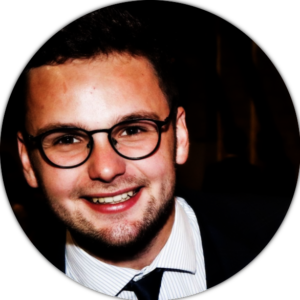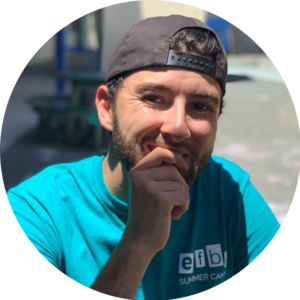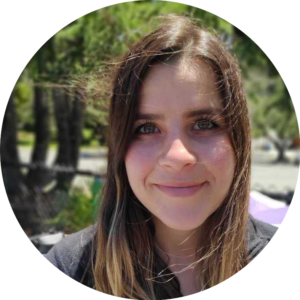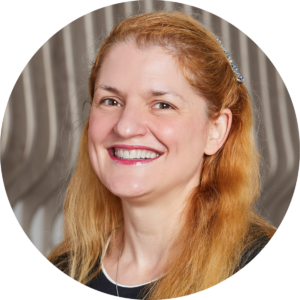In early July, EFBA was inspected by the American Camp Association (ACA), the body that regulates recreational camps for minors in the United States. While waiting for the official results due in November 2019, we sought feedback from our returning camp counselors about the differences between last year’s summer camp and this year’s camp where they applied ACA new standards.
Interview with Thibaud Marcheteau (Interim Lead Camp Counselor of the Mountain View Camp in 2019, Camp Counselor in 2018), Louis Cellier (Camp Counselor in Emeryville in 2018 and 2019), Julia Peillon (Lead Camp Counselor of the Belmont Camp in 2019 and Lead Camp Counselor of the Mountain View Camp in 2018), coming from France under a J1 visa, and with Solène Poulazhan (Camp Counselor at the Belmont camp in 2019 and Camp Counselor at the San Francisco camp in 2018), a local hire.
All these Camp Counselors have worked at EFBA for the second summer in a row.




Question: This year EFBA adapted its summer camps to meet the standards of the American Camp Association. Compared to last year, what differences do you see on the ground?
Louis: I would say more structure! We were trained to pay more attention to hygiene, how we do the dishes, etc. Things are much more structured. In the event of a disaster, we are well prepared. I feel more ready to intervene if a misfortune happens than I did last year. In the event of an earthquake, I will know how to react. We are also better equipped. We have survival kits.
Julia: Since there is no mandatory regulation in California, at first I thought that the rules of ACA would be similar but less stringent than the French “Jeunesse et Sports” standards, as there is no mandatory regulation. In fact the ACA standards are even more complete than in France on many aspects like the preparation for first aid, which is not mandatory at all in France. We do not even have to have one single person who is CPR and first aid trained & certified in a camp in France. On the adult to camper ratio, the ACA standards are more demanding than in France. You can have a camp counselor up to 14 children over 6 years old in France. Here the number of supervised children is much lower.
Solène: It’s better organized! Children are asked to have a cap and a water bottle. We make sure that they are well hydrated and play safely! This year I was shown the emergency exits right away. I went back to help for 3 days in San Francisco camp this year and the Lead Camp Counselor showed me the emergency exits right away. He also showed them to the kids.
Thibaud: I see many differences, even compared to the French “Jeunesse et Sports” standards. There are many more rules on prevention and safety. I see the difference also in terms of comfort, having a specially dedicated healthcare center and having earthquake kits. Accreditation showed us what needed to be improved to have an ideal summer camp. Now we know what to do and what not to do.
Question: What’s an example of what not to do?
Thibaud: Last year we did not pay attention and we put the lunch boxes on the floor outside in the sun for example. Now we make sure they are inside and not on the ground. When we cook with children, we all wear gloves and hairnets to avoid transmitting bacteria. Now we have a healthcare center which is a special and secluded place reserved for children who would be sick. It is very good for kids. The goal is to not only get the accreditation, but also guidance for the camps to be nice and work well.
Question: Do the “standards” of the American Camp Association remind you of the criteria imposed by the Ministry of Youth and Sports (Ministère de la Jeunesse et des Sports) in France?
Thibaud: I don’t know exactly because I have never been Lead Camp Counselor in France, but I have already been responsible for an overnight camp. The standards for cooking are essentially the same except that in France we have to make samples. Here we don’t cook (note: except a weekly culinary project involving cold food or very simple cooking). In terms of physical and mental safety, the ACA standards are at least at equal level if not higher than in France. If the Mountain View camp was inspected by Jeunesse et Sports, it would be accredited by Jeunesse et Sports in France for sure.
Louis: In France, we don’t go deep into safety issues and we don’t feel that this is the priority. In France, I am aware of those standards but I have never experienced an inspection. (Note: the ACA inspectors visited three summer camps including Emeryville).
Question: What can you tell us about the ratio of adults to children in France compared to those of the American Camp Association?
Thibaud: In France for children from 1 to 6 years old, there should be at least 1 adult per 8 children. Here it is 1 for 5. This is ideal for generating language. For older children we must also give them a certain autonomy. The campers are not at school, but on vacation! EFBA also employs salaried or volunteer minors in their camps to guarantee French immersion.
Adults to children ratio recommended by ACA: At least 1 adult for 6 children aged from 4 to 5 years old, 1 adult for 8 children aged from 6 to 8, 1 adult for children aged from 9 to 11. In addition, minors should represent no more than 20% of the camp staff, and the on site supervisor has to be minimum 25 years old. Standards of the American Camp Association/ Standards of the French Ministry of Youth and Sports (Jeunesse et Sports)
Question: Will this change your approach when you return to France?
Thibaud: I know for sure that I will return to France with a completely different frame of mind! For example in France, one is not prepared in case of an intrusion into the school, even though this could happen in France too! Here we have been trained in all emergency situations: earthquake, fire, missing child, active shooter. In France, the camp counselors probably would not know how to react. Now, I feel fully empowered and prepared.
Julia: There are good things to bring back home! For example, checking the temperature of the fridge twice a day. If the milk goes bad and we give it to a child, this will fall under the responsibility of the Lead Camp Counselor. By checking this, you not only protect the children but also yourself. Another example, the adult to child ratio! It would be really ideal (in France)! Now I will make sure that all the children understand the instructions. Here I became aware of the diversity of the level of understanding and that a child may not understand a word, even if I explained it in French in France.
Interview led by Gabrielle Durana.
Interview with Gabrielle Durana, Executive Director of EFBA

Question: Why have you applied for the accreditation of your summer camps?
Gabrielle: I have been interested in the standards and good practices of children’s camps for a long time. When I launched the first French immersion summer camp in Mountain View in 2012, I looked for applicable standards and was very surprised to see there was no mandatory system in place, like there is in France. I thought there must be an supervisory organization making sure that things were done well. That’s when I discovered the accreditation of the American Camp Association, which organizes and promotes best practices for camps with or without accommodation in the United States. I immediately wanted to apply for accreditation even if it was not a licensing process but more of a quality label. In the Anglo-Saxon world, things often work through the “soft law” mechanism, an entity organizes an industry, then promotes and recommends good practices nationwide. “Follow them! You may not follow them, but if you do, it’s better and you can showcase a quality label “.
Question: So what has changed in comparison to last year?
Gabrielle: We identified our weaknesses in terms of safety in relation to events very unlikely to happen but that I call “with catastrophic consequences”- earthquakes and so on. These are events for which it is better to have a plan than not having a plan at all and having to improvise. Accreditation has greatly improved our understanding of the intentional system of good security. The other thing that interested me a lot in the accreditation process is the measurement of outcomes. This is a very Anglo-Saxon approach “What gets measured gets managed”. For example, we ask the children for feedback every Friday about their experience in the camp, and we collect the parents’ opinion through a weekly satisfaction survey and individual interviews after the camp ends. The analysis of these data allows us to constantly seek improvements. These are things that accreditation taught us to do and that we didn’t do before!
Question: In relation to the ratio of adult to children, is it similar or different?
Gabrielle: For us this has led to a change because we used to have under aged camp staff for language immersion purposes. With the ACA, they may not count towards the ratio of adults to children. Also you cannot have more than 20% minors in a team. All of this contributes to raising the quality of our camps!
Interview led by Thibaud Marcheteau.
Stay connected with us!
Follow us on | Facebook | Instagram | #efbaschool

